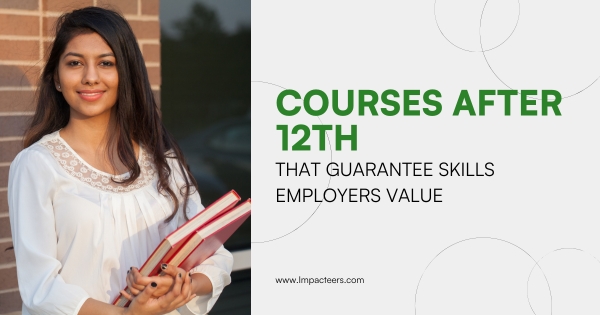Choosing the right courses after 12th can shape your career and open doors to exciting opportunities in your chosen field. The finishing school feels like closing a long book – you are feeling relieved, probably proud, but the question hits fast: “What now?” Parents, relatives and even neighbors want to know your plan.Some of your friends will head straight into college. A few might take a gap year. And then there are those who don’t know what to do next.
The truth is, picking a path after 12th isn’t just about degrees anymore. Employers aren’t waiting for another graduate with a piece of paper. They want skills—proof you can actually handle tasks, solve problems, and adapt to the workplace.
That’s why smart students are choosing courses after 12th that teach in-demand skills, often alongside college. These programs aren’t about stuffing theory into your head. They’re about giving you the confidence to say: “Yes, I can do this job.”
Visit Us >>>> https://www.impacteers.com/home
1. Certification Programs That Add Real Value
While one degree takes years, the certificates may end in a few months. These programs are concentrated, practical, and are designed keeping in mind the needs of the industry.
Great option:
Digital Marketing: Learn SEO, Material and Advertisement; You can start freelancing almost immediately.
Data Analytics: Companies require people who can turn numbers into insight.
Graphic Design: With devices such as Canva, Photoshop and Illustrator, design jobs are everywhere.
Why It Works: Certifications act like proof on your resume. Instead of just saying “I’m interested in marketing,” you can show recruiters a certificate that backs it up.
2. Computer & IT Courses
If you’re even slightly interested in tech, IT courses are a no-brainer. Every industry is digital now. From banking to healthcare, companies need tech people.
Options Worth Exploring:
- Web Development – Build websites and apps, skills that small businesses love.
- Software Development – Perfect for students eyeing coding jobs.
- Cybersecurity – A field growing fast as online threats increase.
- Cloud Computing – Learn platforms like AWS and Azure; these skills are gold in the job market.
Employer Demand: Even if you don’t become a full-time IT professional, knowing basic web development or cybersecurity gives you an edge.
3. Healthcare & Paramedical Courses
Not everyone wants a tech career, and that’s perfectly fine. The healthcare sector is huge, stable, and respected.
Top Picks:
- Diploma in Nursing – Quick entry into healthcare jobs.
- Medical Lab Technician – Behind-the-scenes but essential.
- Pharmacy Courses – Work in hospitals, research labs, or retail.
- Physiotherapy Training – Growing demand, especially in sports and elderly care.
Why Choose This Path? Healthcare roles guarantee jobs and opportunities. You’re not just working—you’re making an impact on lives.
4. Creative & Media Courses
If you’ve got an artistic streak, creative industries have space for you. These courses give you freedom, flexibility, and often the chance to work independently.
Courses After 12th in Creative Fields:
- Animation & Multimedia – Movies, advertising, even gaming studios hire animators.
- Film & Video Editing – Perfect for YouTube or film production houses.
- Photography – A skill that opens doors in weddings, fashion, and media.
Extra Perk: These fields allow you to earn through part-time jobs or freelance gigs while you study further.
5. Management & Business Training
If you see yourself leading teams or even running your own company, management-focused courses are a great start.
Options to Consider:
- Business Administration (BBA) – The classic starting point for future managers.
- Event Management – Learn how to run shows, weddings, and corporate events.
- Hotel & Hospitality Management – The travel and tourism sector always needs fresh talent.
Why Employers Value This: These courses teach organization, leadership, and decision-making—skills every company needs.
6. Vocational Training Courses
Let’s be real. Not everyone wants to sit in a classroom for years. Some prefer hands-on training that leads directly to jobs.
Practical Courses:
- Automobile Mechanics – Great for students who love machines.
- Fashion Designing – Combine creativity with career.
- Electrician Training – Skilled trades are always in demand.
- Beauty & Wellness – From salons to personal coaching, opportunities are everywhere.
What Makes It Great? These are job-ready courses. You finish training and can start working or even launch your own small business.
7. Language & Communication Courses
Here’s a secret: communication skills often matter more than technical skills in interviews. A student who can explain ideas clearly will often beat one who can’t.
Useful Courses:
- Foreign Languages – French, German, Japanese, and Spanish open doors abroad.
- Public Speaking – Helps in interviews, client meetings, and presentations.
- Content Writing – Every company needs writers for websites and ads.
Why It Matters: Strong communication adds polish to your resume and makes you more confident in real-world situations.
8. Online Courses and Remote Learning
The pandemic taught us something big—online learning works. Today, you can gain global knowledge without leaving your room.
Benefits of Online Programs:
- Flexible – Learn at your pace.
- Affordable – Often cheaper than classroom courses.
- Diverse – You can learn coding, finance, design, or even personal development.
Platforms like Impacteers Skills stand out here. They focus on certifications and training that match employer expectations. Instead of wasting months on irrelevant topics, you get exactly the skills recruiters are hiring for
9. Why Employers Value Skills Over Degrees
Times have changed. Your grandparents may have gotten jobs just by holding a degree. But today, thousands of graduates compete for the same role. What makes the difference? Skills.
Think about it. If two candidates apply for a job and one shows a college degree, while the other has both a degree and certifications in digital marketing and analytics, who looks better?
That’s why employers are loud and clear: skills + education = success.
10. Balancing Studies With Part-Time Jobs
One of the smartest things you can do after 12th is mix learning with part-time jobs. It’s not just about money—it’s about experience.
Examples:
- A student in digital marketing can manage social media for local shops.
- Someone studying web development can build basic websites for startups.
- A healthcare student might assist in a small clinic.
Employers love this combination. It proves you know how to manage time, learn quickly, and apply skills outside textbooks.

Conclusion
The duration after the 12th is filled with options, but the smart move is clear: select the courses that create the value of skill employers. Whether it is IT, healthcare, management, or creative industries, the right program will help you stand in a crowded job market.
And here is the kicker – you don’t have to do it alone. Platforms such as impacter skills direct you to certificates and training designed with employers. This means that you are not just studying – you are preparing for real opportunities.
So instead of waiting till graduation to find out things, start now. Choose the right course, build valuable skills, and step confidently in your future
About Us >>>> https://blog.impacteers.com/
FAQs
1. Which courses after 12th guarantee jobs?
Courses in IT, healthcare, and creative fields like digital marketing or nursing often lead to quick job opportunities.
2. Are online courses after 12th worth it?
Yes. Online learning platforms like Impacteers Skills provide employer-relevant certifications, making you job-ready faster.
3. Do vocational courses have career growth?
Absolutely. Many vocational courses, like fashion or mechanics, allow you to work independently or scale into full businesses.
4. Should I focus only on degrees?
Degrees matter, but employers prefer students who combine degrees with practical certifications or skills training.
5. Can I get part-time jobs after 12th while studying?
Yes, many students take freelance or part-time jobs in design, marketing, and tutoring while pursuing certifications.



Post Comment